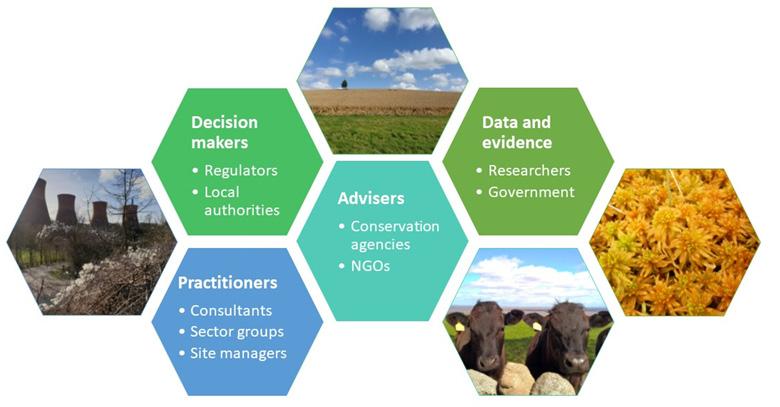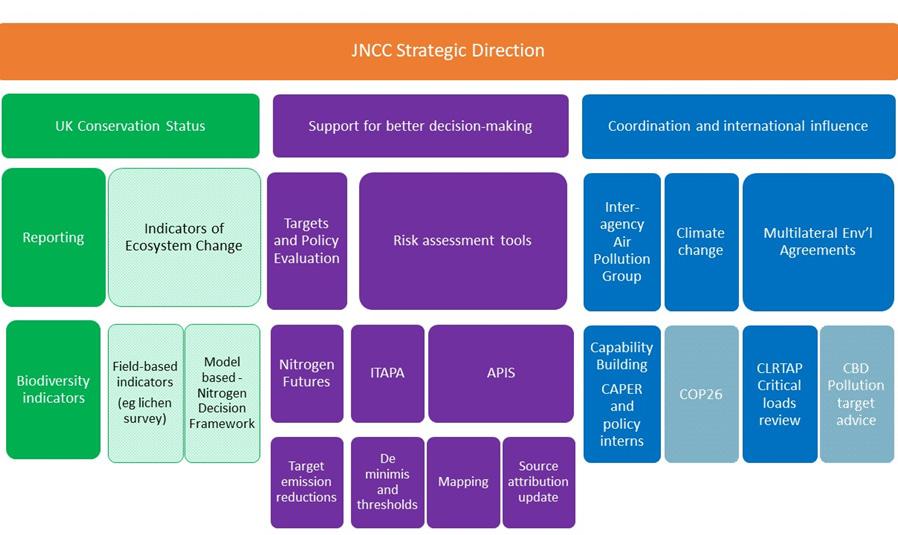
4 minute read
2020 - a year of air pollution progress
In the Summer 2020 edition of Nature News we explored how engagement with our air pollution work has increased, and how global understanding about air pollution and its effects on people and nature is growing. Restrictions due to lockdowns put many things on hold, but the work we’ve undertaken with our partners this year to tackle the effects of air pollution on ecosystems has blossomed. Perhaps it's because this is a time of increased awareness of the importance of nature, air quality and social change. New evidence is emerging to quantify the changes in air quality in response to shutdown of major cities at global scale. In the UK a 55% reduction in nitrogen oxides was observed around UK roads when compared with 2019 (Higham et al 2020). This has helped more people realise the scale of change required to improve air quality to levels that will achieve goals for human health and function of UK ecosystems.
The devolved administrations across the UK are making commitments not only to prevent degradation of our habitats, but also to restore and invigorate them. We see this through individual country clean air strategies, the International Nitrogen Initiative, the UN Decade on Ecosystem Restoration, the Leaders’ Pledge for Nature and in the enhanced provision for UK joint working through JNCC and the Inter-agency Air Pollution Group (IAPG). Reducing air pollution is an important part of ensuring habitat restoration can happen.
There is some good news as reported in the UK Biodiversity Indicators, which show a long term decrease in the area of sensitive habitat vulnerable to nitrogen deposition. However, over 57% of UK habitat area still receives damaging amounts of nitrogen (Rowe et al 2020). So, despite the national improvement, there is still more work to do and we need to ensure these interventions matter (see Nitrogen Futures article).
Our collaboration with the IAPG, devolved administrations and partners is important for a range of activities including:
• securing national emission reductions that maximise benefit for ecosystems;
• raising awareness of the vulnerability of nature to air pollution;
• understanding interactions with climate change and global ambitions, as well as
• supporting local actions required to protect and enhance our protected areas.
Air pollution advice is a broad work area, crossing country boundaries and requiring a wide range of partners (Figure 1 below). Researchers, policymakers and non-governmental organisations (NGOs) contribute data and evidence, as well as helping to deliver interventions on the ground. This not only allows us to understand issues with air pollution but also its impact on habitats. Partnerships mean the work is used by decision-makers, advisers and practitioners to design and implement solutions for the future. To truly implement strategic approaches to air pollution we have engaged with experts from a variety of disciplines — dispersion modellers, statisticians, GIS specialists, local planners, ecologists, economists, social scientists and even software architects!

Broad reaching and better together
Given its cross-cutting nature, these joint efforts to address air pollution have strong links to JNCC’s recently updated Strategic Direction for 2020 to 2025 (Figure 2 below). It’s worth remembering that our air pollution advice includes effort from several teams across the organisation. Many individual projects contribute to the evolving workplan described below:
• UK conservation status and nature strategies – The IAPG has been sharing evidence with its partners and the devolved administrations to increase the impact of individual research projects and use UK-level joint-working to deliver the greatest benefit from investment. Biodiversity indicators are part of JNCC’s core work. We are working with partners to pursue areas for research and development such as indicators of both damage and recovery of ecosystems from air pollution effects.
• Support for decision-making has been a key focus in 2020 as the IAPG and other partners grapple with case law and UK risk-assessment approaches. This has benefitted from significant investment recently with projects such as Nitrogen Futures, De Minimis and air pollution thresholds, Emission Source attribution dataset updates, enhancement of existing tools planned for APIS and a look at integrating UK riskassessment tools through the Integrating Tools for Air Pollution Assessment Project. We will keep you posted in future Nature News issues as these projects evolve.
• Coordination and international influence are both core parts of our work and a developing area for air pollution advice at JNCC. Staples such as the IAPG and engagement in the Community for Air Pollution Effects Research mean we can ensure UK evidence gathering and capability are fit for purpose. As multilateral environmental agreements look to refresh ambitions around pollution, including from air pollution, our experts are working with the devolved administrations to leverage UK expertise and evidence at global level through enhanced joint working in the UK.

If you want to learn more please join the JNCC Air Pollution Project Stakeholder group to keep up to date on opportunities to input your expertise and for notifications on project developments.
References Higham, J., Ramírez, C.A., Green, M. et al (2020) UK COVID-19 lockdown: 100 days of air pollution reduction? Air Quality, Atmosphere, and Health https://doi.org/10.1007/s11869-020-00937-0. Rowe, E.C., Mitchell, Z., Tomlinson, S., Levy, P., Banin, L.F., Sawicka, K., Martín Hernandez, C. and Dore, A. (2020) Trends Report 2020: Trends in critical load and critical level exceedances in the UK. Report to Defra under Contract AQ0843, CEH Project NEC05708 (online). Available at https://uk-air.defra.gov.uk/library/reports?report_id=1001. Accessed 14 October 2020.
Contact
Susan Zappala, Senior Air Pollution Adviser susan.zappala@jncc.gov.uk
Alexandra Cunha, Nitrogen Futures Project Manager alexandra.cunha@jncc.gov.uk




